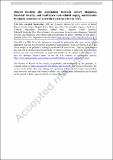Shared burden: the association between cancer diagnosis, financial toxicity, and healthcare cost-related coping mechanisms by family members of non-elderly patients in the USA
Author(s)
Kazzi, Bahaa; Chino, Fumiko; Kazzi, Brigitte; Jain, Bhav; Tian, Sibo; Paguio, Joseph A.; Yao, J. S.; Muralidhar, Vinayak; Mahal, Brandon A.; Nguyen, Paul L.; Sanford, Nina N.; Dee, Edward C.; ... Show more Show less
Download520_2022_7234_ReferencePDF.pdf (635.4Kb)
Publisher Policy
Publisher Policy
Article is made available in accordance with the publisher's policy and may be subject to US copyright law. Please refer to the publisher's site for terms of use.
Terms of use
Metadata
Show full item recordAbstract
Abstract
Purpose
There has been little research on the healthcare cost-related coping mechanisms of families of patients with cancer. Therefore, we assessed the association between a cancer diagnosis and the healthcare cost-related coping mechanisms of participant family members through their decision to forego or delay seeking medical care, one of the manifestations of financial toxicity.
Methods
Using data from the National Health Interview Survey (NHIS) between 2000 and 2018, sample weight-adjusted prevalence was calculated and multivariable logistic regressions defined adjusted odds ratios (aORs) for participant family members who needed but did not get medical care or who delayed seeking medical care due to cost in the past 12 months, adjusting for relevant sociodemographic covariates, including participant history of cancer (yes vs. no) and participant age (18–45 vs. 46–64 years old). The analysis of family members foregoing or delaying medical care was repeated using a cancer diagnosis * age interaction term.
Results
Participants with cancer were more likely than those without a history of cancer to report family members delaying (19.63% vs. 16.31%, P < 0.001) or foregoing (14.53% vs. 12.35%, P = 0.001) medical care. Participants with cancer in the 18 to 45 years old age range were more likely to report family members delaying (pinteraction = 0.028) or foregoing (pinteraction < 0.001) medical care. Other factors associated with cost-related coping mechanisms undertaken by the participants’ family members included female sex, non-married status, poorer health status, lack of health insurance coverage, and lower household income.
Conclusion
A cancer diagnosis may be associated with familial healthcare cost-related coping mechanisms, one of the manifestations of financial toxicity. This is seen through delayed/omitted medical care of family members of people with a history of cancer, an association that may be stronger among young adult cancer survivors. These findings underscore the need to further explore how financial toxicity associated with a cancer diagnosis can affect patients’ family members and to design interventions to mitigate healthcare cost-related coping mechanisms.
Date issued
2022-07-25Department
Massachusetts Institute of Technology. Department of Brain and Cognitive SciencesPublisher
Springer Berlin Heidelberg
Citation
Kazzi, Bahaa, Chino, Fumiko, Kazzi, Brigitte, Jain, Bhav, Tian, Sibo et al. 2022. "Shared burden: the association between cancer diagnosis, financial toxicity, and healthcare cost-related coping mechanisms by family members of non-elderly patients in the USA."
Version: Author's final manuscript